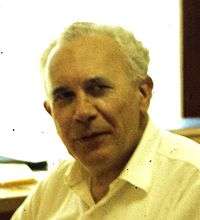Max Krook
Max Krook (1913 – 4 August 1985) was an American mathematician and astrophysicist.[1]

Krook was born in Standerton, South Africa, the son of Pesach Israel Krook and Leah Krook.[2] An undergraduate at the University of the Witwatersrand, Krook received a doctorate in mathematics from Cambridge University in England in 1938 under the supervision of Arthur Eddington.[3] He was subsequently recruited to Birmingham University by Rudolf Peierls.[4]
Krook came to the United States in 1950 as a research associate in physics at the Indiana University, soon moving to the Smithsonian Astrophysical Observatory in Cambridge, Massachusetts. He was additionally appointed a research fellow at the Harvard College Observatory in 1952. In 1956, he became a lecturer in astronomy, and, in 1959, a professor in the Harvard's Division of Applied Sciences and the department of astronomy. Robert May (later, Baron May of Oxford) was one of his first postdoctoral students.[5] Krook was for decades a regular at Cambridge's Legal Sea Foods restaurant, where a particular table was often held for him at lunchtime.[1]
Krook married Gulielma Penn-Gaskel White, 1952 graduate of Radcliffe College, and later successful photographer, in 1956. Although ultimately divorced, they continued to share a residence in Arlington, Massachusetts until the time of his death.[6]
Krook is remembered for his contribution to the Bhatnagar-Gross-Krook model.[1]
Selected works
- Functions of a Complex Variable: Theory and Technique, by George F. Carrier, Max Krook, and Carl E. Pearson, SIAM, 2005, ISBN 0-89871-595-4 (first edition: McGraw-Hill, 1966, ISBN 0-07-010089-6).
- Bhatnagar, P. L.; Gross, E. P.; Krook, M. (1954-05-01). "A Model for Collision Processes in Gases. I. Small Amplitude Processes in Charged and Neutral One-Component Systems". Physical Review. American Physical Society (APS). 94 (3): 511–525. doi:10.1103/physrev.94.511. ISSN 0031-899X.
References
- "MAX KROOK, 72, DIES, EX-PROFESSOR, The New York Times, 10 August 1985 (accessed 12 June 2008).
- Geni, "Max Krook"
- Mathematics Genealogy Database, "Max Krook"
- G.E. Brown, Selected Papers with Commentary, of Tony Hilton Royle Skyrme (World Scientific, 1994), p. 13.
- Australian Academy of Science, "Lord Robert May, physicist and ecologist" Archived 2015-06-03 at the Wayback Machine
- SheltiesOnLine.com, "Memorial: Gulielma Penn-Gaskel White Krook, 76, photographed shelties and collies"